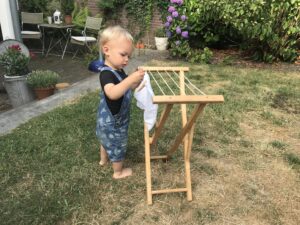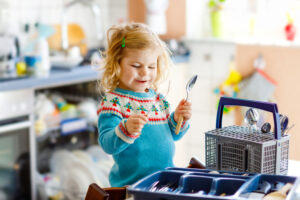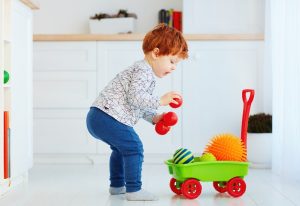What Chores Are Right For My Child?
Chores. Kids don’t like them, and parents use them to get some extra help around the house. But don’t worry parents; you’re actually helping with your child’s development. Parents some times are confused about choosing age-appropriate chores for kids.

Kids can start taking on household chores and small tasks as early as two years old. There are so many chores a child can do to help them reach their next milestone. Age appropriate chores can range from putting on pajamas to cleaning up toys.
Keep in mind, your child won’t know how to do all of these chores right away, so a little guidance is necessary. Having your child complete these tasks in their early years will help with their overall development in the long run.
2-3 Years

- Put the Toys in the Bin – Telling your child “I bet I can put these away faster than you” will make the chore more of a game and more fun for your child. Cleaning up toys may allow your child to walk up and down stairs, or simply walk across the room with a toy in their hand, helping with their gross motor skills. They also have the chance to identify where things belong. Using a “clean up” song is also very helpful, this is a strategy many day cares/preschools use; use the same one your child hears in those settings
 Sort Clothes by Color – “Let’s put all the greys together, all the blues together, and all the white together” helps your child’s sensory development. Focus on one color at a time “let’s get the red ones!”
Sort Clothes by Color – “Let’s put all the greys together, all the blues together, and all the white together” helps your child’s sensory development. Focus on one color at a time “let’s get the red ones!”- Follow the Leader – Giving your child directions like “throw it in the trash” or “put it by the door” helps them learn how to follow simple instructions.
- Copycat (Housework Edition) – From 2-3 years old, children love to do what mommy and daddy are doing. Let them be present as you do housework. If they have a small broom or toy vacuum, they can follow along and copy what you do.
Check out your 2-3 year old’s milestones here!
3-4 Years

- Switcharoo – If your child has a sibling or friend, invite them to do a chore together like putting away toys in a storage bin. Each child brings you one toy at a time and taking turns they put everything away.
- Table Time – “If I put down the napkins, you have to put the forks on top”, letting your child follow you around the table helps them understand the concept of in, on, and under. The fork goes on top of the napkin, or the water goes in the glass.
- Close What You Open – Reminding your child to “put the top back on once you’re done” will let them practice opening and closing containers whenever they play. Using small jars or storage containers for crayons, craft supplies and small toys is a good way to keep organized and help your child work on sorting skills.
4-5 Years
- Getting Ready – Use a visual checklist to help a child get ready in the morning. The pictures will help your child develop self care routines like putting on pajamas, going to the bathroom, brushing teeth and getting ready for bed. This will also help them start understanding time.
- Cut Your Food – At this age, your child can cut their own food. Take it a step further and let them pour, cut, and mash food. For example, your child could help you mash bananas for banana bread or potatoes for mashed potatoes.
5-6 Years
- Get a Snack – Your child can get their own snack from the fridge, get the correct silverware, eat and clean up their snack on their own.
- Daily Tasks – At this age, your child can be given more independent, but still supervised, chores. They are old enough to feed the dog or water the plants.
There are many age appropriate chores a child can have that actually give them an opportunity to learn new skills. Chores let your child practice executive functioning, motor, sensory, and communication skills.
Who knew chores were so helpful?! But it makes sense when you think about all the movement, direction following, talking, touching, seeing, and other actions children use when they accomplish the above tasks. So have your child pick up their toys, unload the dishwasher, feed the dog; but don’t have them drive to the grocery store for milk just yet, we’ll work up to that.
